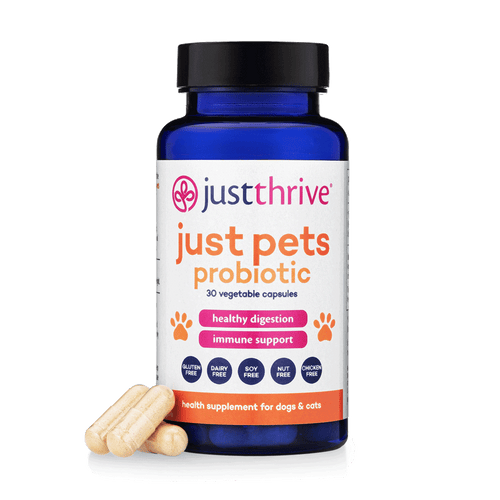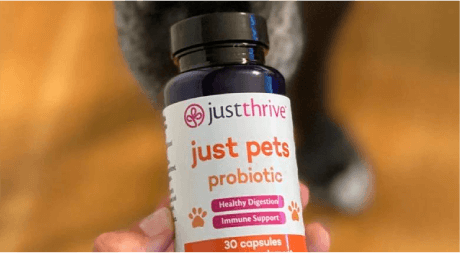When it comes to your dog’s health, naturally you just want the best for them. Perhaps you’ve heard that probiotics and CBD are both good for dogs, but you’re not sure which one to give your fur baby. And when you search online for more information, it’s hard to know which advice to trust.
You’re already being a great pet parent by sticking with natural ways to keep your pup feeling great. And looking for reliable resources just shows how much you care. And we do, too.
So here we’ll give you the rundown on both CBD and probiotics and talk about how each may benefit your dog.
CBD + Dogs = Benefits With Question Marks
A lot of pet owners swear by CBD oil for things like pain and anxiety in their dogs… but there are only a handful of scientific studies confirming CBD’s effectiveness in pets. That doesn’t mean CBD can’t be helpful for your dog, just that there are still a lot of question marks and that more studies are needed.
Here’s what research tells us so far about CBD for dogs:
- CBD treatment may help support healthy inflammation responses in dogs[1]
- CBD supplements may increase joint comfort in some dogs[2]
- CBD may possibly help dogs with epilepsy, but there’s conflicting evidence on its effectiveness for seizures[3]
- CBD can be hard for dogs to fully absorb, especially if they’re dealing with any kind of gut issue.[4]
With limited research to rely on, we don’t really know enough about how CBD can benefit your dog. Luckily, research in this area is starting to pick up, so we may have better information soon – including optimal dosing for different-sized dogs.
So if you’re looking for a proven way to improve your dog’s overall health, mood, and energy, you’ll want to look for a different option.

 Want to listen instead of read?CLICK HERE
Want to listen instead of read?CLICK HERE
Probiotics And Your Dog’s Health (And Behavior)
If you’ve ever taken a clinically-proven probiotic, perhaps you know first-hand how beneficial they can be for your digestive and immune health. The right pet probiotic can work the same way for your dog.
Just like you, your dog has a gut microbiome that contains trillions of bacteria. When your pup’s gut is in healthy balance, beneficial probiotic bacteria vastly outnumber harmful pathogens. And since about 70% of your dog’s immune system is housed in their gut,[5] that microbiome has a huge impact on their overall well-being. Those probiotic bacteria are responsible for educating your dog’s immune system and protecting them against pathogens.[6]
Along with keeping your dog’s immune system on track, probiotics also help your dog:
- Absorb and process nutrients[7]
- Increase the population and diversity of beneficial bacteria[8]
- Maintain a healthy weight[9]
- Enjoy strong bones and comfortable joints[10]
- Have healthy skin and a shiny coat[11]
- Remain calm and steady even in stressful circumstances[12]
A healthy gut positively affects your dog’s overall health and quality of life, including how they feel and behave.[13]
Unfortunately, it’s easy to knock a healthy gut out of balance. When that happens – a condition called dysbiosis – you’ll start to see distress signs in your pup.
What Causes Dog Dysbiosis?
It doesn’t take much for dysbiosis to set in and allow pathogens to run rampant in your dog’s microbiome. It could be as simple as pesticides from a neighbor’s yard… eating some trash… a loud noise like thunder or fireworks… or a bad case of separation anxiety. Any of those can trigger dysbiosis for your pup.
And unfortunately – Dysbiosis causes all sorts of issues for your dog. Gut issues usually show up first: diarrhea, foul-smelling stool, room-clearing gas.[14] But the problems don’t stop there. Dysbiosis can set off other health challenges including:
- Anxious or aggressive behaviors
- Itchy skin
- Allergies
- Inflammation
- Unusual weight gain or loss
- Low energy
Luckily, the solution is simple. You can help your pup overcome dysbiosis, rebalance their gut, and stay on a healthier path with gut support specifically designed for them.

How To Find The Right Probiotic for Your Dog
Probiotic supplements are proven to keep your dog’s gut microbiome in healthy balance and soothe GI discomfort.[15] And when you give your pup the right probiotic, one specifically formulated for dog microbiomes, it can transform their gut health.[16]
A clinical study involving healthy dogs and dogs with severe GI issues showed that a unique blend of spore probiotics made a dramatic difference.[17] The probiotic formula contained strains known to specifically benefit dog microbiomes:
- Bacillus subtilis HU58
- Bacillus licheniformis, and
- Pediococcus acidilactici
And to test it, researchers worked with two groups of dogs: one group that included dogs with dysbiosis suffering from uncomfortable symptoms and one group that included healthy dogs with no gut issues.
All of the dogs got the probiotic formula for 30 days… with notably positive results:
- GI issues were dramatically reduced or disappeared entirely.
- Farting was reduced even in healthy dogs.
- No healthy dogs experienced negative side effects.
Bottom line: The right spore probiotic strains can keep your dog comfortable and healthy, with results you can count on backed by science.
Make the Best Choice for Your Dog’s Health
You love your fur baby more than anything and want to give them the best of everything. A healthy gut microbiome can keep them feeling calm, comfortable, and full of life. And Just Pets Probiotic can help keep your dog’s gut microbiome in healthy balance.
Just Pets Probiotic contains Bacillus subtilis HU58, Bacillus licheniformis, and Pediococcus acidilactici, probiotic strains proven to be effective for keeping your dog’s gut well-balanced and comfortable.
Just mix a single helping Just Pets Probiotic into your dog’s food every day for a happy, healthy pup.
>> Tap here to discover the clinically proven power of Just Pets Probiotic
Still on the fence about trying Just Pets Probiotic for your dog?
Good news – Now you can test drive Just Pets Probiotic to see if it works well for your dog. And we’re sure that it will.
But if for any reason you and your pup aren’t satisfied, you can ask for a full product refund at any time.
That’s because EVERY Just Thrive purchase is covered by our Bottom of the Bottle, 100% money back guarantee. Even if it’s 3 months or 3 years later. And even if the bottle is empty!
>> Try Just Pets Probiotic 100% Risk Free Today
Sources:
[1] Gugliandolo E, et al. Effect of Cannabidiol (CBD) on Canine Inflammatory Response: An Ex Vivo Study on LPS Stimulated Whole Blood. Vet Sci. 2021 Sep 4;8(9):185.
[2] Lima TM, Santiago NR, Alves ECR, Chaves DSA, Visacri MB. Use of cannabis in the treatment of animals: a systematic review of randomized clinical trials. Anim Health Res Rev. 2022 Jun;23(1):25-38.
[3] Potschka H, Bhatti SFM, Tipold A, McGrath S. Cannabidiol in canine epilepsy. Vet J. 2022 Dec;290:105913.
[4] Della Rocca G, Paoletti F, Conti MB, Galarini R, Chiaradia E, Sforna M, Dall'Aglio C, Polisca A, Di Salvo A. Pharmacokinetics of cannabidiol following single oral and oral transmucosal administration in dogs. Front Vet Sci. 2023 Jan 6;9:1104152. doi: 10.3389/fvets.2022.1104152. PMID: 36686155; PMCID: PMC9859632.
[5] The power of probiotics: Benefits for the whole dog. Cornell University College of Veterinary Medicine. https://www.vet.cornell.edu/. Page accessed 5/15/2023.
[6] Pilla R, Suchodolski JS. The Role of the Canine Gut Microbiome and Metabolome in Health and Gastrointestinal Disease. Front Vet Sci. 2020 Jan 14;6:498.
[7] Lee D, Goh TW, Kang MG, Choi HJ, Yeo SY, Yang J, Huh CS, Kim YY, Kim Y. Perspectives and advances in probiotics and the gut microbiome in companion animals. J Anim Sci Technol. 2022 Mar;64(2):197-217.
[8] White R, Atherly T, Guard B, Rossi G, Wang C, Mosher C, Webb C, Hill S, Ackermann M, Sciabarra P, Allenspach K, Suchodolski J, Jergens AE. Randomized, controlled trial evaluating the effect of multi-strain probiotic on the mucosal microbiota in canine idiopathic inflammatory bowel disease. Gut Microbes. 2017 Sep 3;8(5):451-466.
[9] Xu H, Huang W, Hou Q, Kwok LY, Laga W, Wang Y, Ma H, Sun Z, Zhang H. Oral Administration of Compound Probiotics Improved Canine Feed Intake, Weight Gain, Immunity and Intestinal Microbiota. Front Immunol. 2019 Apr 2;10:666.
[10] Cintio M, Scarsella E, Sgorlon S, Sandri M, Stefanon B. Gut Microbiome of Healthy and Arthritic Dogs. Vet Sci. 2020 Jul 14;7(3):92.
[11] Marchegiani A, Fruganti A, Spaterna A, Dalle Vedove E, Bachetti B, Massimini M, Di Pierro F, Gavazza A, Cerquetella M. Impact of Nutritional Supplementation on Canine Dermatological Disorders. Vet Sci. 2020 Apr 3;7(2):38.
[12] Yu-Min Yeh, Y. Yeh, Xin-Ying Lye, X. Lye, Han-You Lin, H. Lin, Jia-Yi Wong, J. Wong, Chien-Chen Wu, C. Wu, Chin-Lin Huang, C. Huang, Ying-Chieh Tsai, Y. Tsai, & Lih-Chiann Wang, L. Wang. (0000). Effects of Lactiplantibacillus plantarum PS128 on alleviating canine aggression and separation anxiety. Applied animal behaviour science, 247, 105569.
[13] Pilla R, Suchodolski JS. The Role of the Canine Gut Microbiome and Metabolome in Health and Gastrointestinal Disease. Front Vet Sci. 2020 Jan 14;6:498.
[14] Honneffer JB, Minamoto Y, Suchodolski JS. Microbiota alterations in acute and chronic gastrointestinal inflammation of cats and dogs. World J Gastroenterol. 2014 Nov 28;20(44):16489-97.
[15] Schmitz S, Suchodolski J. Understanding the canine intestinal microbiota and its modification by pro-, pre- and synbiotics - what is the evidence? Vet Med Sci. 2016 Jan 11;2(2):71-94. doi: 10.1002/vms3.17. PMID: 29067182; PMCID: PMC5645859.
[16] White R, Atherly T, Guard B, Rossi G, Wang C, Mosher C, Webb C, Hill S, Ackermann M, Sciabarra P, Allenspach K, Suchodolski J, Jergens AE. Randomized, controlled trial evaluating the effect of multi-strain probiotic on the mucosal microbiota in canine idiopathic inflammatory bowel disease. Gut Microbes. 2017 Sep 3;8(5):451-466.
[17] Whittemore JC, Moyers TD, Price JM. Randomized, controlled, crossover trial of prevention of antibiotic-induced gastrointestinal signs using a synbiotic mixture in healthy research dogs. J Vet Intern Med. 2019 Jul;33(4):1619-1626. doi: 10.1111/jvim.15553. Epub 2019 Jul 3. PMID: 31268578; PMCID: PMC6639531.











